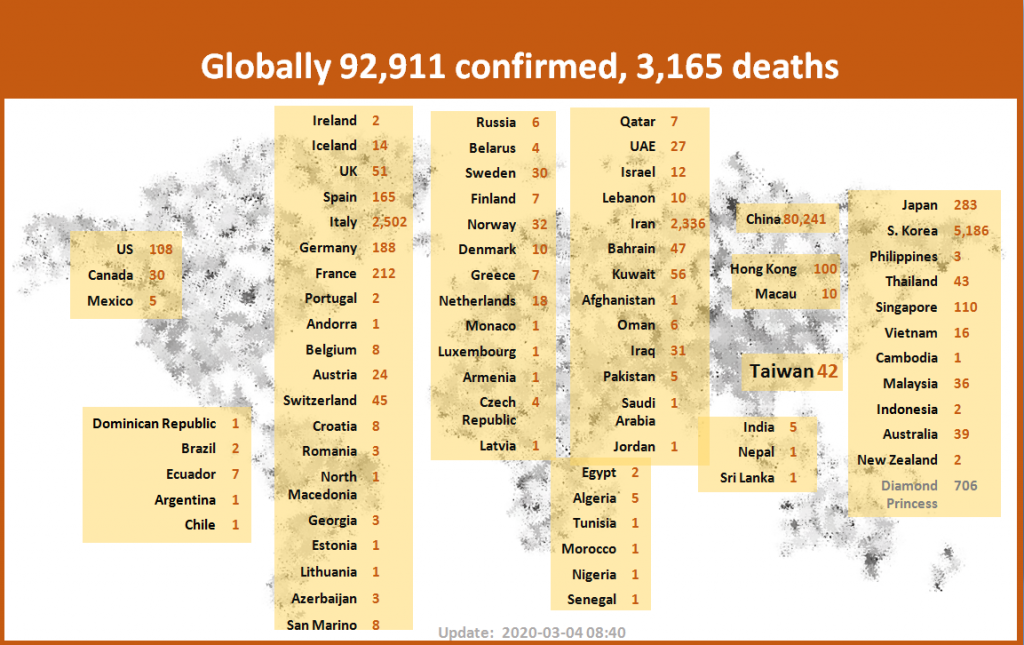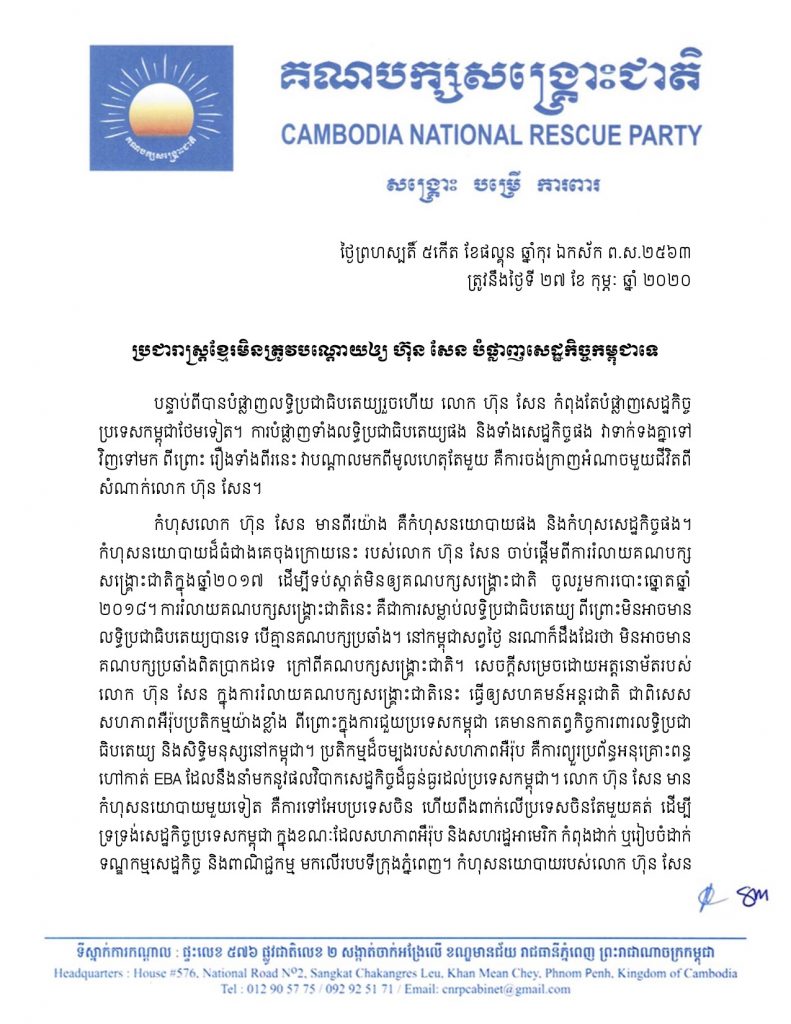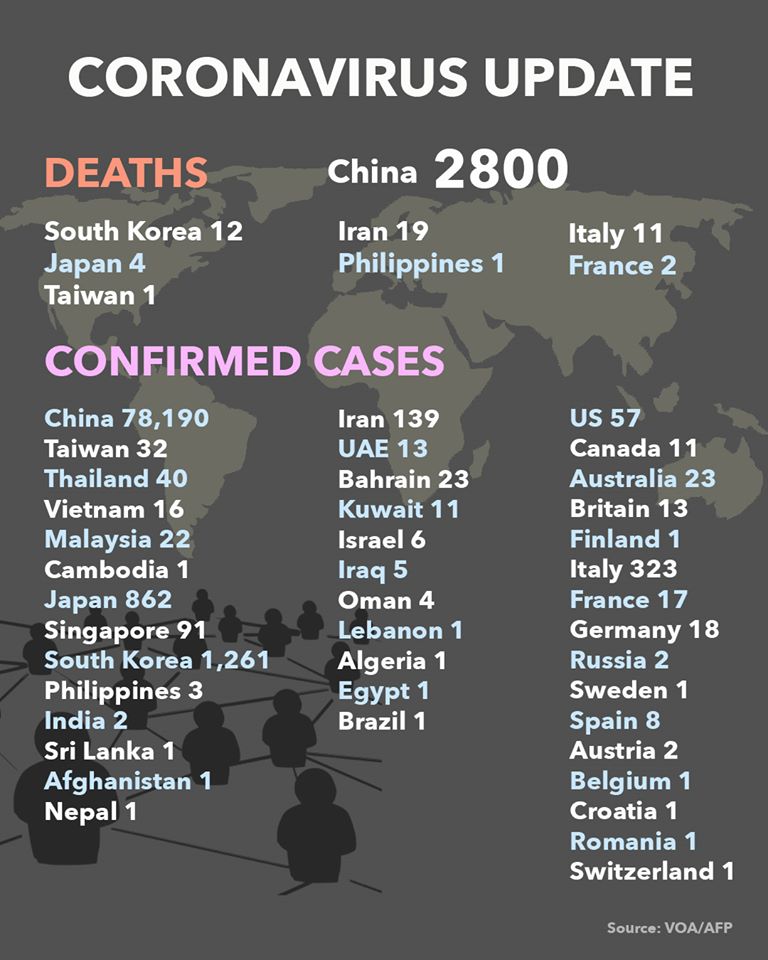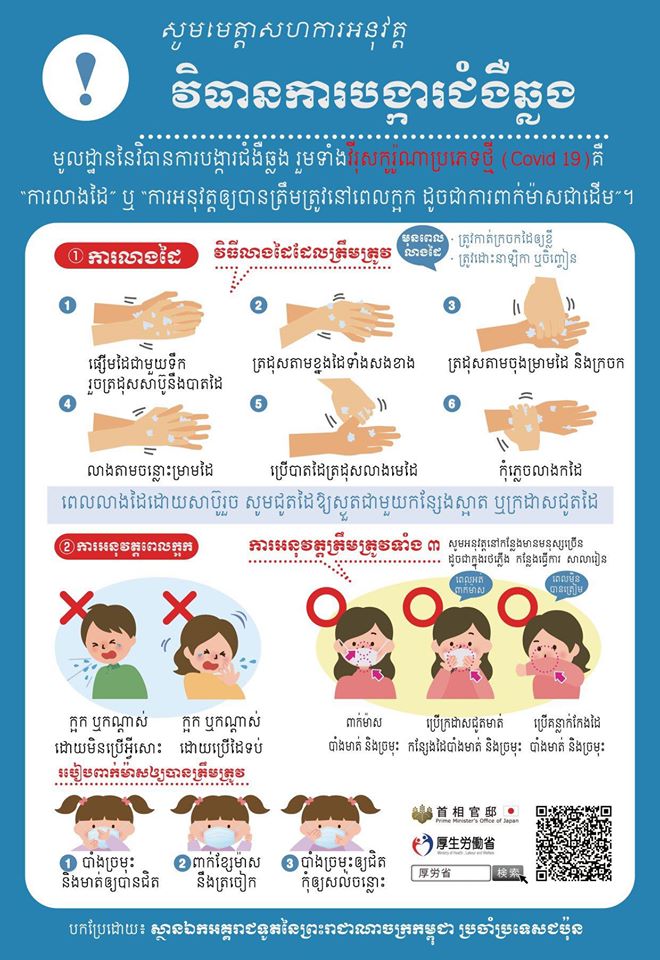Original source for your reference: CambodianInterpreter.Org
Coronaviruses (CoV) are a family of viruses that cause sicknesses like the common cold, as well as more severe diseases, such as Middle East Respiratory Syndrome and Severe Acute Respiratory Syndrome. A novel coronavirus (nCoV) is a new strain – one that hasn’t previously been recognized in humans.
Coronaviruses (CoV) គឺជាអំបូរនៃវីរុសដែលបង្ករឱ្យមានជំងឺដូចជាផ្តាសាយធម្មតាក៏ដូចជាជំងឺធ្ងន់ធ្ងរជាច្រើនទៀត ដូចគ្នានឹងរោគសញ្ញាផ្លូវដង្ហើមមជ្ឈិមបូព៌ានិងរោគសញ្ញាផ្លូវដង្ហើមធ្ងន់ធ្ងរ។ មេរោគប្រលោមលោកថ្មីគឺជាវីរុសថ្មីមួយដែលមិនត្រូវបានគេទទួលស្គាល់នៅក្នុងខ្លួនមនុស្សទេពីមុនមក។
Coronaviruses cause diseases in mammals and birds. A zoonotic virus is one that is transmitted between animals and people. When a virus circulating in animal populations infects people, this is termed a “spillover event”.
ជំងឺ Coronaviruses បង្កជំងឺក្នុងថនិកសត្វនិងបក្សី។ វីរុសហ្សូណូទិកគឺជាវីរុសមួយដែលឆ្លងរវាងសត្វនិងមនុស្ស។ នៅពេលវីរុសដែលរាលដាលនៅក្នុងហ្វូងសត្វ ហើយឆ្លងទៅមនុស្សនេះត្រូវបានគេហៅថា“ព្រឹត្តិការណ៍លេចធ្លាយ” ។
How does CoVID-19 affect the body? តើកូវិដ១៩ ប៉ះពាល់ដល់រាងកាយយ៉ាងដូចម្តេច?
The virus is fitted with protein spikes sticking out of the envelope that forms the surface and houses a core of genetic material. Any virus that enters your body looks for cells with compatible receptors – ones that allow it to invade the cell. Once they find the right cell, they enter and use the cell’s replication machinery to create copies of themselves. It is likely that COVID-19 uses the same receptor as SARS – found in both lungs and small intestines.
វីរុសនេះត្រូវបានបំពាក់ដោយជាតិប្រូតេអ៊ីនដែលស្ថិតជាប់នឹងផ្នែកខាងក្រៅដែលបង្កើតជាផ្ទៃនិងជាស្នូលនៃសារធាតុហ្សែន។ វីរុសណាមួយដែលចូលក្នុងខ្លួនរបស់អ្នក វាស្វែងរកកោសិកាដែលមានឧបករណ៍ទទួលសញ្ញាដែលត្រូវគ្នា – ដែលអនុញ្ញាតឱ្យវាលុកលុយចូលក្នុងកោសិកាបាន។ នៅពេលដែលពួកគេរកឃើញកោសិកាត្រឹមត្រូវ ពួកគេចូលហើយប្រើគ្រឿងម៉ាស៊ីនចម្លងរបស់កោសិកាដើម្បីបង្កើតច្បាប់ចម្លងដោយខ្លួនឯង។ វាទំនងដូចជាកូវិដ-១៩ ប្រើឧបករណ៍ទទួលសញ្ញាដូចគ្នានឹងសារ – រកឃើញទាំងក្នុងសួតនិងពោះវៀនតូច។

It is thought that CoVID-19 shares many similarities with SARS, which has three phases of attack: viral replication, hyper-reactivity of the immune system, and finally pulmonary destruction. Early on in infection, the coronavirus invades two types of cells in the lungs – mucus and cilia cells. Mucus keeps your lungs from drying out and protects them from pathogens. Cilia beat the mucus towards the exterior of your body, clearing debris – including viruses! – out of your lungs. Cilia cells were the preferred hosts of SARS-CoV, and are likely the preferred hosts of the new coronavirus. When these cells die, they slough off into your airways, filling them with debris and fluid. Symptoms include a fever, cough, and breathing difficulties. Many of those infected get pneumonia in both their lungs.
វាត្រូវបានគេគិតថាកូវិត១៩ ចែករំលែកភាពស្រដៀងគ្នាជាច្រើនជាមួយរោគសារដែលមានការវាយប្រហារបីដំណាក់កាលគឺ៖ ការបង្កើតច្បាប់ចម្លងវីរុស ប្រតិកម្មខ្ពស់ទៅលើប្រព័ន្ធភាពស៊ាំ និងទីបំផុតការបំផ្លាញសួត។ នៅពេលមានការឆ្លងមេរោគ វីរុសកូរ៉ូណាបានរាតត្បាតកោសិកាពីរប្រភេទនៅក្នុងសួត – កោសិកាជាតិរំអិលនិងកោសិការោមល្អិតឆ្មាឈ្មោះស៊ីលីយ៉ា។ កោសិកាជាតិរំអិលការពារសួតរបស់អ្នកពីការស្ងួតនិងការពារភ្នាក់ងារជំងឺ។ កោសិការោមល្អិតឆ្មាឬស៊ីលីយ៉ារុញច្រានជាតិទឹករំអិលឆ្ពោះទៅផ្នែកខាងក្រៅនៃរាងកាយរបស់អ្នកដើម្បីសំអាតកំទេចកំទី – រួមទាំងមេរោគចេញពីសួតរបស់អ្នក។ កោសិការរោមល្អិតឆ្មាគឺជាម្ចាស់ផ្ទះដែលមេរោគសារនិងកូវិដចូលចិត្តជាងគេ ហើយទំនងជាម្ចាស់ផ្ទះដែលចូលចិត្តទទួលយកវីរុសថ្មី។ នៅពេលកោសិកាទាំងនេះងាប់ពួកវានឹងរអិលចូលទៅក្នុងផ្លូវដង្ហើមរបស់អ្នកដោយបំពេញវាដោយកំទេចកំទីនិងសារធាតុរាវ។ រោគសញ្ញារួមមានគ្រុនក្តៅ ក្អក និងពិបាកដកដង្ហើម។ ភាគច្រើននៃអ្នកដែលឆ្លងជំងឺនេះមានជំងឺរលាកសួតទាំងពីររបស់ពួកគេ។
Continue reading




